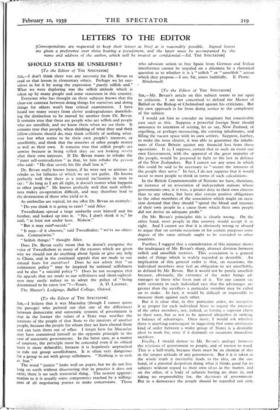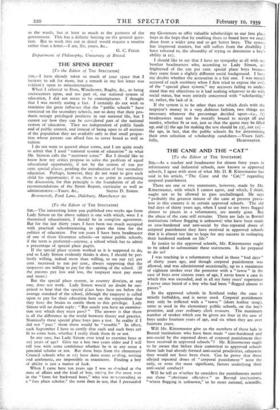ITo the Editor of THE SPECTATOR]
Sut,—Mr. Bevan's article on this subject seems to me open to criticism. I am not concerned to defend the Master of Balliol or the Bishop of Chelmsford against his criticisms. But his own approach is far from doing justice to the complexity of the subject.
I would ask him to consider an imaginary but conceivable case such as this. Suppose a powerful foreign State should announce its intention of seizing, let us say, New Zealand, of expelling, or perhaps massacring, the existing inhabitants, and filling the vacant space with its own settlers. Suppose, further, to make the issue clearer, it was able to guarantee the inhabi- tants of - Great Britain against any financial loss from these operations. It is, I suppose, certain that in such an event our own Government, with the approval of the great majority of the people, would be prepared to fight to the last in defence of the New Zealanders. But I cannot see any sense in which this could be said to be necessary to "secure the interests of the people they serve." In fact, I do not suppose that it would occur to most people to think in terms of such calculations.
In the British Commonwealth of Nations we have, therefore, an instance of an association of independent nations whose governments owe, it is true, a greater duty to their own citizens than to any others, but have also certain positive obligations to the other members of the association which might on occa- sion demand that they should "spend the blood and treasure of their own people in a cause from which their own people did not derive an adequate profit."
On Mr. Bevan's principles this is clearly wrong. On the other hand, most people in this country would accept it as right. And I cannot see that it is obviously wrong or absurd to argue that on certain occasions or for certain purposes some degree of the same attitude ought to be extended to other countries.
Further, I suggest that a consideration of this instance shows the inadequacy of Mr. Bevan's sharp, abstract division between selfish and unselfish motives. This association is a general order of things which is widely regarded as desirable. An implication of this general order is that, on occasions, the individual members may feel an obligation to act unselfishly, as defined by Mr. Bevan. But it would not be purely unselfish because, obviously, the existence of the order brings ad- vantages to those who form part of it. Yet one cannot say with certainty in each individual case that the advantages are greater than the sacrifices a particular member may be called on to make. In fact, it would be difficult or impossible to measure them against each other.
But it is clear that, in this particular order, we recognise it as proper for each individual State to regard the interests of the other members, not, indeed, as having a superior claim to their own, but as not to be ignored altogether in striking a balance of advantages. Once more, I would ask whether there is anything extravagant in suggesting that some analogous kind of order between a wider group of States is a desirable ideal to work for, even if it demands on occasions immediate sacrifices.
Finally, I should demur to Mr. Bevan's analogy between the relations of government to people, and of trustee to ward. This is a half-truth, because there must be an element of this in the proper attitude of any government. But if it is taken as the whole truth it inevitably leads to the idea, on the one hand, of a paternal despotism doing what it thinks good for its subjects without regard to their own ideas in the matter, and on the other, of a body of subjects having no share in, and taking no responsibility, for, the decisions of government. But in a democracy the people should be regarded not only as the wards, but at least as much as the partners of the government. This has a definite bearing on the general ques- tion. But to work this out in detail would require a treatise rather than a letter.—I am, Sir, yours, &c.,
G. C. FIELD.-
Department of Philosophy, Untversity of Bristol.















































 Previous page
Previous page